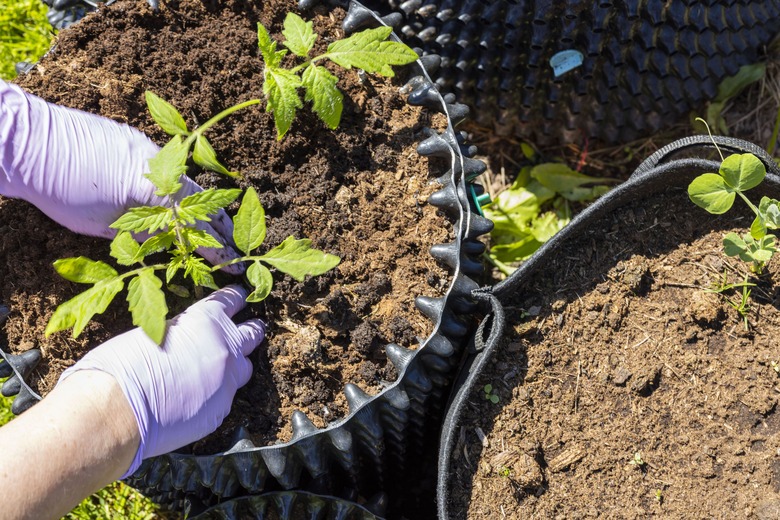Is Vinegar Good For Tomato Plants?
We may receive a commission on purchases made from links.
Tomatoes (Solanum lycopersicum, USDA plant hardiness zones 10-11) are one of the home gardener's favorite plants, largely because a freshly picked, homegrown tomato and a store-bought tomato are so dramatically different. Growing them successfully can sometimes be challenging, so gardeners often turn to popular home "remedies" such as Epsom salt or vinegar to give themselves an edge. While you can use vinegar successfully with tomatoes, there are only a few specific cases where it's genuinely helpful.
Tip
Vinegar can be used successfully with tomatoes in a few specific ways, but it may be an exaggeration to say it's "good" for the plants.
Using Vinegar to Kill Weeds
Using Vinegar to Kill Weeds
One widespread folk usage for vinegar is as a weed killer, to suppress stubborn weeds that might compete with your tomato plants or, even worse, act as hosts for pests or vectors for tomato diseases. While there is a scientific basis for this, there are also a couple of important limitations you should know.
First, the acid found in vinegar will indeed kill weeds by disrupting their cell walls. The cells rupture, their fluids escape and the plant withers and dies. This is good up to a point, but the effect is limited. First, household vinegar — even at full strength — isn't strong enough to quickly and reliably kill the weeds. For that, you'll need to use something called horticultural vinegar, which is 20 percent acetic acid or higher compared to household vinegar's 5 percent.
There are a couple of further problems. One is that even at this concentration, the acid only kills the part of the weed it comes into contact with. The roots will survive and grow into a new weed. A second is that the acid will kill your tomato plants just as effectively as anything else. A third issue is that horticultural vinegar is a strong corrosive, and you'll need to follow strict guidelines to use it safely. In the end, it's no more effective than pulling or hoeing weeds the traditional way, so you'll need to decide whether messing with a strong acid is preferable to the wear and tear on your back.
Vinegar for Blossom-End Rot
Vinegar for Blossom-End Rot
One of the more common troubles afflicting home tomato growers is blossom-end rot. It's exactly what the name suggests: The blossom end of your tomatoes will begin to rot and turn black, eventually ruining the entire fruit.
The rot is caused by a calcium deficiency, either because the soil's calcium has been depleted or because you haven't been watering the plants consistently (when the soil is dry, the plants can't absorb calcium from it). If you've been watering your plants consistently, and you're seeing signs of blossom-end rot, vinegar can play a role in rescuing your tomatoes.
Save up your eggshells at a rate of roughly one eggshell per tomato plant and grind them to a powder in a spice grinder or blender. Dissolve the eggshells overnight in vinegar, then add the calcium-rich solution to your water the next day when you water the plants. The vinegar will help speed the tomatoes' uptake of calcium from the eggshells.
